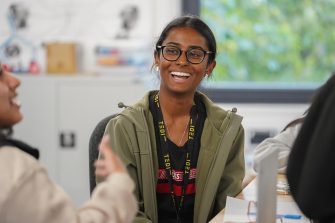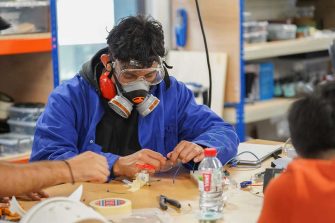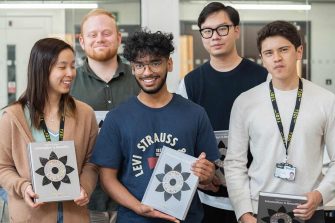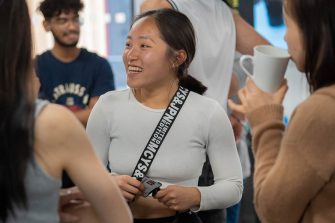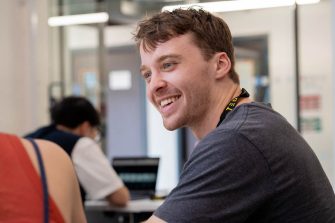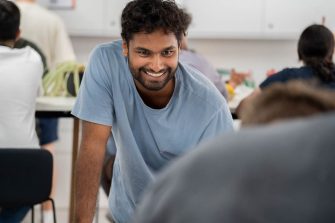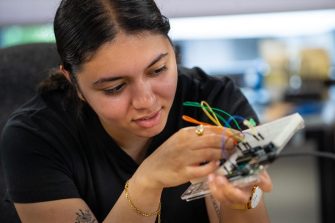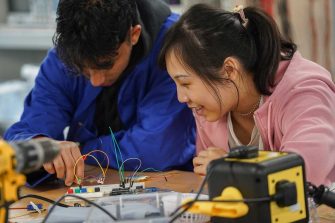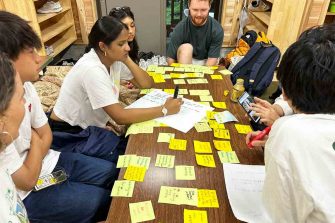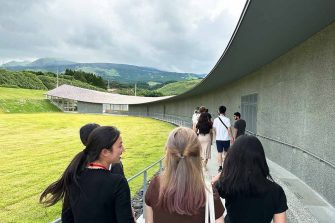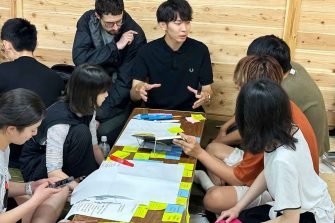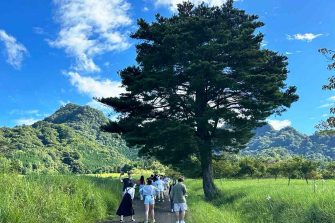CDEV3300/ 6200 Global Practice of Work
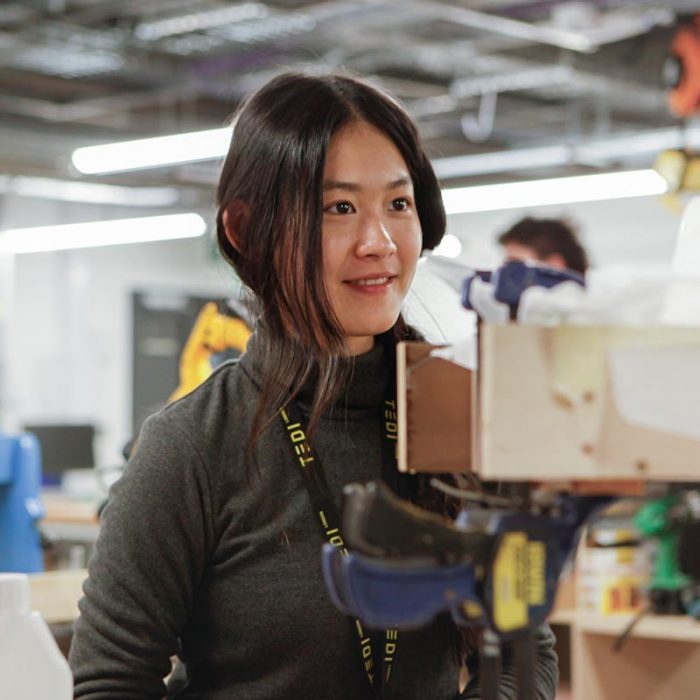
Designed to provide you with a global understanding of the world of work, and the skills needed to succeed, CDEV3300 Global Practice of Work / CDEV6200 Global Partnered Work Project allows you the opportunity to work in an international environment on genuine business issues.
You will work in small student-interdisciplinary teams for an international company and network with industry leaders and UNSW alumni. You will also learn about local customs through an immersive cultural experience and connect with new friends at our partner university.
Course Highlights
Work with an OVERSEAS partner organisation on a co-designed project to provide the organisation with purposeful deliverables.
Develop skills in teamwork, project management, problem solving, design thinking and communication.
Work in interdisciplinary teams and gain understanding of how to work effectively with people from other disciplines and backgrounds.
Gain support on professional development through personal and professional reflection.
Please note
CDEV3300/CDEV6200 is not a self-enrolment course. Students will need to go through an interview process with WIL Central. Once successful, students will be enrolled by the WIL Central Team.
Applications for Term 2C 2025 Japan: Kyushu University or Gate Gourmet Japan have closed.
Japan, Term 2C 2025 - Gate Gourmet Japan Ltd. & Kyushu University
CDEV3300/6200 is designed to provide students with a global understanding of the world of work and the skills required to tackle real-world problems through interdisciplinary group work.
In Term 2C 2025, students will have the opportunity to work with:
- Kyushu University: One of Japan's leading research-oriented institutes of higher education, consistently ranking as one of the top ten Japanese universities in the Times Higher Education World University Rankings and the QS World Rankings.
- Gate Gourmet Japan Ltd.: A global company with the most comprehensive catering network in the aviation industry.
-
The students will travel to Japan for two weeks in Term 2C 2025. Students will work on the project on a full-time basis during this period in Fukuoka, Kumamoto and Narita depending on their chosen projects. Students will all be accommodated together as part of the experience.
-
Project 1: Kyushu University - Partnership with Kumamoto City Contemporary Art Museum
Saturday, 23 August to 6 September
Re-evaluating modern and contemporary architecture in Kumamoto. How can we convey to people the appeal of postwar architecture, which has yet to be evaluated? And what kind of cultural and economic effects can this have?
Project work in Fukuoka will be held at Kyushu University. Project work in Kumamoto will be held at the site of Kumamoto City Contemporary Art Museum.
Project 2: Gate Gourmet Japan Ltd. - Optimising Business Operations
Saturday, 30 August to 13 September
Exploring opportunities to optimise business operations and process improvements at Gate Gourmet Japan. Project work will be held at Gate Gourmet Japan Ltd. office in Narita Airport.
-
CDEV3300 Global Practice of Work
You are eligible to apply:
- if you are an undergraduate student at UNSW with good academic standing
- as a general education (available to all faculties); or free elective for some degrees; or as BCom Final Year Synthesis course (UNSW Business School)
- if you have completed 30 UOC by course commencement, Term 2C, 2025.
CDEV6200 Global Partnered Work Project
You are eligible to apply:
- if you are a postgraduate student at UNSW with good academic standing
- if you are able to take on this course as a free elective, available in some postgraduate degrees.
Check your eligibility:
- Self-check with myPlan
- Request a Programme progression check
- Enquire with the Nucleus.
No space in your program?
- Submit a Course Substitution Request.
Enrolment, Overload and Special Consideration
To enable your participation in CDEV3300/CDEV6200 in Term 2C 2025, students should ensure that enrolment in this course fits within your degree, and follow the UNSW requirement which allows a maximum of two other courses during Term 2 2025.
- If you plan to take up to four courses in Term 2, 2025 (including CDEV3300/6200), you must seek Overload Approval.
- Special Consideration (applied for only project with the Kyushu University): You must apply for Special Consideration if any exam clashes, and Special Consideration is only granted for:
- In-person exam coincides with your time in Tokyo (Mon 25-Aug to Thu 28-Aug)
- Online Exam if there is any Group Travel Day.
Kindly note that:
- We will send your information to the Special Consideration team, and your name will be verified against their list
- You will be eligible to take the exam during the Second Supplementary exam period when you’re back to Sydney
- No additional options for Special Consideration will be available if you miss this supplementary exam due to illness.
No Special Consideration will be granted:
- For holidays taken in Japan before or after your project
- For assignments due while you are in Japan
- For online exams.
It is expected that you manage your time effectively to meet all deadlines.
-
Accommodation:
- Single-room accommodation will be organised for all UNSW students.
Students will be required to arrange their own:
- Flights, transit, visa (if required to enter Japan)
- Vaccinations, personal expenses, personal tourism and social activities
- Daily transport, and meals/living costs whilst overseas.
-
In addition to the course fee required for CDEV3300/6200, students must pay a program fee to participate.
This fee is payable to UNSW on confirmation of enrolment and is non-refundable.
Indicative program fee will be around AUD2,500 – 3,000. The program fee covers single room accommodation and some internal transfers. The fee will be payable to UNSW on confirmation of enrolment and is non-refundable.
The OS-HELP loan scheme may be available to eligible Australian students enrolled in a Commonwealth Supported Place for a range of expenses such as airfare accommodation and other travel or study expenses. Visit our OS-HELP page for more information.
-
Applications for CDEV3300/CDEV6200 Term 2C 2025 have closed.
Please note that CDEV3300/6200 is not self-enrolled.
- Students will go through an interview process with WIL Central
- Once successful, students will be enrolled by the WIL Central Team.
Previous partner projects
-
This was an exciting London-based opportunity for students who participated in a cross-cultural & multidisciplinary learning experience to explore real-world issues related to urban redevelopment.
TEDI-London’s vision is to transform engineering education to transform lives – this meant preparing students with the skills and knowledge to identify and solve global challenges. Resilient, sustainable, healthy and productive communities are key to society. A vibrant, comprehensive and effective transport system is required in order for communities to achieve these aspirations.
On this project students investigated and proposed innovative transport solutions in and around the London suburb of Canada Water (where TEDI-London is located). They worked with experts across the TEDI-London founding partners as well as key industry stakeholders such as Network Rail, Transport for London, and, British Land where they developed innovative approaches and solutions, offering opportunities to practical implementation.
Students were required to understand the problem through research and data analysis, then conceptualise and work in collaboration in TEDI-London’s makerspaces to design, prototype and trial engineering solutions.
“If you only go on one trip in your university career, be sure to pick this one. TEDI-London assembled a dynamic and enthusiastic team of students from UNSW Sydney, King’s College London, and Arizona State University to tackle some of the real-life challenges that the London community faces. During our journey, we had the opportunity to engage and connect with leaders from Global Generation, British Land, London Grow, JLL and most importantly, members of the local Canada Water community. The Summer School program truly challenged the way that we think and perceive, however the best aspect of it all, was the focus on building natural relationships with one another, which we will now have for a lifetime.”
- Jordan, UNSW ADA Student
-
In the Japan course students had the opportunity to travel to Fukuoka & Minamiaso, Japan, and collaborate with students and academics from Kyushu University on a project aimed at exploring the process of adaptive reuse and how it can be applied to enable the restoration of key architectural landmarks.
Shoei Yoh is a leading figure in 20th Century architecture in Japan. His office archive is now with Kyushu University, who have collaborated with UNSW’s Computational Design academics to digitise Yoh’s archive, and have recorded his buildings in 3D to capture this legacy.
Yoh’s Music Atelier, built in 1985, sits in the Aso Mountains and has laid empty for many years. The Music Atelier is next to the iconic Aspecta outdoor amphitheatre venue, also designed by Yoh. Sadly, if a use cannot be found for the Music Atelier building, this important architectural work may face demolition.
On this course, students travelled to Japan for two weeks, visiting the port city of Fukuoka (a city of 5 million and home to Kyushu University) and the Aso Mountains in central Kyushu, where they explored possibilities for the adaptive reuse of Yoh’s Music Atelier. The academic project partner is Kyushu University, Faculty of Design. Kyushu is one of the highest-ranking universities in Japan, and the Faculty of Design is located in the Ohashi Campus, in inner city Fukuoka.
Students met with stakeholders from industry, government, academia and the local Minamiaso community to research, explore and ultimately propose sustainable solutions for the adaptive reuse of this building and surrounds. Students also collaborated with students from Kyushu University on the project.
Students share their experience
TEDI-London, UK
CDEV3300 broadened my horizons about global work environments through networking with experienced industry professionals. Leading a diverse team, we collaborated effectively to deliver high quality products and presentations.
“If you only go on one trip in your university career, be sure to pick this one. TEDI London assembled a dynamic and enthusiastic team of students from UNSW Sydney, King’s College London, and Arizona State University to tackle some of the real-life challenges that the London community faces. During our journey, we had the opportunity to engage and connect with leaders from Global Generation, British Land, London Grow, JLL and most importantly, members of the local Canada Water community. The Summer School program truly challenged the way that we think and perceive, however the best aspect of it all, was the focus on building natural relationships with one another, which we will now have for a lifetime.”
Jordan (UNSW ADA Student)
“Prototyping, making, interacting, collaborating, ideating, iterating projects around urban farming for TEDI London's Summer School 2022 was an absolute blast! No brief, no barriers, full support from the academic team resulted in complex, meaningful and impressive responses for our client. Coming from a background of landscape architecture, the intersectionality of the multitude of disciplines was particularly interesting and adds depth to any project-based work."

